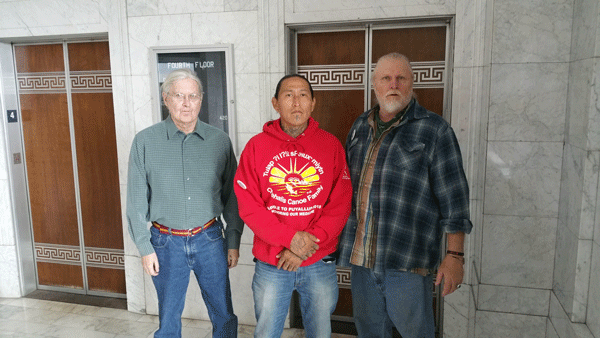‘How does this movie end?’ Climate change hits the courtroom

Three protesters who were arrested for blocking the entrance to Wells Fargo Bank in downtown Duluth last January went to trial Oct. 19 at the St. Louis County Courthouse in Duluth.
Scot Bol, Michael Niemi and Ernesto Burbank blocked the entrance to protest the bank’s investments in fossil fuels on Jan. 12. Their focus was on Wells Fargo’s relationship with Enbridge, whose pipelines transport crude oil through Minnesota.
The three were charged with misdemeanor trespassing, disorderly conduct and obstructing the legal process. But the second two charges were dropped, leaving only the misdemeanor trespassing. If convicted they would each receive a $300 fine plus $85 in fees. The stakes are not high except, the defendants say, for the planet.
This is Bol’s second civil disobedience arrest in Duluth. In 2015 he was one of several protesters arrested for occupying the Enbridge office in Technology Village. In their trial they used the “necessity defense,” arguing that they were breaking the law in order to prevent greater harm to the environment by Enbridge’s proposed Pipeline 3. At the time, Judge Mark Munger rejected the defense, saying the protesters had legal options to address the issues.
In that case the defendants represented themselves. “This time we have lawyers,” Bol told the Reader outside the courtroom in the recent trial. Representing the defendants were attorney J.T. Haines and Jennifer McEwen.
The necessity defense was recently used by four people who turned off emergency shutoff valves on Enbridge pipelines near Bemidji. Earlier this month the judge dismissed the case, saying there was insufficient proof they caused any damage.
At the opening of the Duluth trial, Judge John Schulte wryly noted, “This will be very different from the typical petty misdemeanor.”
Defense attorney McEwen said the the necessity defense “does not encourage anyone to go out and break the law if they don’t like something.” It’s a very specific defense with a long history, she said. “It’s not to open a Pandora’s box.”
The defense called three witnesses. Ryan Casey Jones works for Natural Investments, a portfolio management company that encourages companies to use socially responsible practices.
“It’s not a hippie approach,” he said, noting that one fifth of the wealth in the country is managed with such strategies. Still, he said, “It’s hard to ask an oil and gas company to stop producing oil and gas.”
Companies are “increasingly responsive to dialogue on climate change and indigenous right,” he said. He also said civil disobedience is effective in raising awareness and bringing the companies to the table.
Representing the City of Duluth, Attorney Mary Asmus asked Jones if illegal actions are more effective than legal ones. Jones said, “I don’t assign extra stars for the ones happening illegally ... I’m going to take notice regardless of the means.”
The next witness was Dr. Christina Gallup, associate professor of Earth and Environmental Sciences at the University of Minnesota Duluth. She cited the recent report by the United Nations Intergovernmental Panel on Climate Change: Average world temperatures have risen 1 degree Centigrade since pre-industrial times, and scientists estimate that the threshold for global catastrophe is 1.5 degrees. There are only 12 years to halt the increase before that threshold is reached. Duluth faces up to 60 days a year over 100 degrees, the loss of boreal forests, and a landscape of bushes and scrubs.
“This is science yelling and screaming,” she said. The Line 3 pipeline, which Wells Fargo is bankrolling, will carry oil from the Canadian tar sands, “one of the dirtiest oil deposits that exists,” she said.
The third witness was Tara Houska, tribal attorney and campaign director for the activist group Honor the Earth. She noted the Minnesota Public Utilities Commission took thousands of hours of testimony, yet unanimously approved Line 3, overriding the recommendations of the Minnesota Department of Commerce and the administrative law judge who conducted the public hearings.
Houska said protesters balance the harm of trespassing with the harm to drinking water. “What else am I supposed to do? I feel like it’s people who don’t have any other alternatives … Regulations are written to approve industries always.” Going after the the financiers of global warming is a much better strategy than dealing with oil companies themselves, she said.
“Congress is still debating whether climate change is real as the seas rise on our shoes. It’s happening now,” she said.
The three defendants also testified. Michael Niemi, wearings headphones as a hearing device, said he visited the Canadian tar sands: “It’s as close to an alien planet as I’ve ever seen.” He also said he is an activist even though “I really don’t have much hope for the planet.” Quoting author Chris Hedges, he said, “I don’t fight fascists because I’ll win. I fight fascists because they are fascists.”
Ernesto Burbanks, from Arizona, came north to take part in the Standing Rock protests and connected there to activists in Duluth. He said, “I would never encourage other people to be arrested. But you have a child and look at them every night and have to explain to them why they don’t have clean water.”
Asmus asked where he draws the line between legal and illegal actions. “Sometimes you have to put your body on the line, show up at the job site and make people aware,” he said.
Scot Bol testified how during the protest, “I had this bike lock around my neck and I was watching people go by, and thinking, ‘I’m the sane one here’ … This is a very serious time.” He also sang “Walk With Me” by Maggie Wheeler: “I walk for the water, the water is life, I walk with the promise of healing in sight, I walk for the children and their right to survive.”
The attorneys from both sides will prepare their closing arguments as written briefs by Nov. 16. The judge said he expects to make a decision before Christmas.
Judge Schulte said the protest “was a very civil incident” with “respectful interaction with law enforcement,” resulting in the other charges being dismissed. His decision would not about whether climate change is real, but “the much more difficult question” of how the necessity defense applies to this case.
“It is baffling to me that we are the only country to discuss whether climate change is a thing, not what to do about it,” Schulte said. “How does this movie end?”
